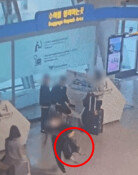Korea’s naïve approach to currency swap deal with U.S.
Korea’s naïve approach to currency swap deal with U.S.
Posted March. 01, 2016 13:55,
Updated March. 01, 2016 14:11
Regarding the Korea-U.S. currency swap deal, which has been suspended since February 2010, Deputy Prime Minister and Finance Minister Yoo Il-ho said, “It is only right to sign a deal again. And we are willing to propose a discussion to the U.S. when the time is right.” Yoo made such remarks during his meeting with journalists after attending the G20 Finance Ministerial and Central Bank Governors Meeting, which was held in Shanghai on Saturday. A day earlier, the deputy prime minister announced that he agreed to begin an early discussion to extend the Korea-China currency swap deal whose maturity is 20 months away after his meeting with Governor of People's Bank of China Governor Zhou Xiaochuan. Two days in a row, Yoo cited currency swap as an accomplishment.
The won-dollar exchange rate exceeded the mark of 1240 on Monday for the first time in five years and eight months. With the exchange rate being so volatile, currency swap deal is the best hand the Korean government can play to prevent losing foreign reserves. During the global financial crisis in 2008, the Lee Myung-bak administration signed a currency swap deal with the U.S. on a scale of 30 billion dollars and maintained the deal for one year and four months from October 2008, playing a major role for the Korean economy to weather through the crisis in fair shape. The principle could be applied to the presence of the U.S. forces in Korea preventing North Korean provocations.
As currency swaps are a bilateral deal, there is always a weaker party that is forced to take a low profile. Korea has signed currency swap deals with China, Australia, UEA, Malaysia, and Indonesia among others. It is true that Korea has been more active than the other parties in pursing the deal with some of the countries mentioned above, but this is the first time that the government has disclosed its plan to pursue a currency swap deal in advance. Doing so carries the risk placing us in a disadvantageous position in negotiating the currency exchange ratio and other terms.
In fact, Deputy Prime Minister Yoo said, “I am a bit concerned that it could send a signal to the market that Korea is pursuing the deal out of desperateness,” but the concern that he worried about is being felt in the market already. A government official made an additional announcement that it was merely a fundamental statement in an attempt to ease the concern, but there is no taking back the remarks publicly made by the head in charge of finance. During the G20 meeting, the member states issued a joint communiqué that monetary policies alone cannot induce balanced growth, but they failed to draw up a detailed measure for coordination aimed at preventing global currency war. As early as starting this month, countries will come up with monetary policies designed to cater to their own interests. Such a naïve approach to show all our cards before starting negotiation will only lead to a bitter struggle amidst the fierce global currency war.







